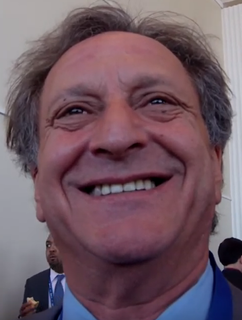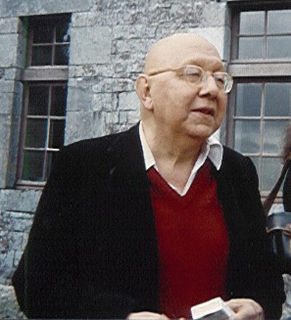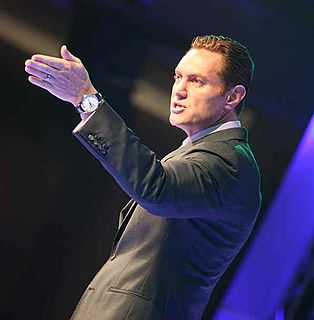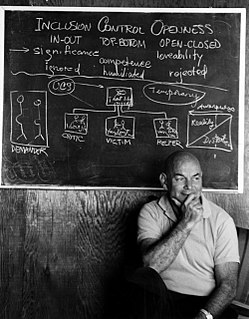Top 370 Behaviors Quotes & Sayings - Page 6
Explore popular Behaviors quotes.
Last updated on April 20, 2025.
The Tipping Point is the biography of an idea, and the idea is very simple. It is that the best way to understand the emergence of fashion trends, the ebb and flow of crime waves, or, for that matter, the transformation of unknown books into bestsellers, or the rise of teenage smoking, or the phenomena of word of mouth, or any number of the other mysterious changes that mark everyday life is to think of them as epidemics. Ideas and products and messages and behaviors spread just like viruses do.
Of all the major religions, or lack thereof, the atheist's is one of the best pretenders: his foundation for all existences, as well as moral behaviors for the permanent good of mankind, begins at science but ends at himself, the Napoleon complex of both intelligence and imagination. On the other hand the anti-theist wouldn't survive without a deity beyond himself to hunt. He doesn't pretend, he simply nullifies his own position.
I was powerless over my childhood but the coping strategies that I developed, to survive, all of which were creative and brilliant and got me through, as an adult those became my defects of character. Those became my shortcomings, control and all that kind of stuff... and that's my responsibility. I was a blameless child in what happened in the home; I take responsibility for my behaviors as an adult.
The reality is that living digitally rewires our brains for perpetual motion, shallow surface thinking, and compulsive/addictive behaviors. Because our world is only going to become more tech-driven with each passing day, unless we find ways to counterbalance these detrimental effects, we'll remain spiritual babes, drinking milk for the rest of our lives instead of the solid food God has for us.
The mechanism of primary emotions does not describe the full range of emotional behaviors. They are, to be sure, the basic mechanism. However, I believe that in terms of an individual's development they are followed by mechanisms of secondary emotions, which occur once we begin experiencing feelings and forming systematic connections between categories of objects and situations, on the one hand, and primary emotions, on the other.
There is a woman named Wendy Wood, who did a study when she was at Duke, and she followed around college students to try to figure out how much of their day was decision-making versus how much was habit. And what she found was that about 45 percent of all the behaviors that someone did in a day was habit.
For changes to be of any true value, they've got to be lasting and consistent. Any time you sincerely want to make a change, the first thing you must do is to raise your standards... If you don't set a baseline standard for what you'll accept in life, you'll find it's easy to slip into behaviors and attitudes or a quality of life that's far below what you deserve... Whatever happens, take responsibility... The only thing that's keeping you from getting what you want is the story you keep telling yourself.
Change is difficult and it takes time. It is hard for people to change their own behavior, much less that of others. Change programs normally address attitudes, ideas, and rewards. But the behaviors of people in organizations are also strongly shaped by habits, routines, and social norms. Real change requires new power relationships, new work routines and new habits, not just intent.
I do think there is an enhanced awareness of insecurity and vulnerability that induces anxiety that creates pressure on teachers and administrators to offer simplistic explanations and to be resistant to expressions of attitudes that can be viewed as unpatriotic, which is further interpreted as applicable to any tendency to challenge the government when it claims to be acting overseas to avoid repetitions of 9/11 or to encroach on domestic freedom to identify suspicious persons and behaviors.
I knew I could not live my life around a husband, now would I want a husband to live his life around me. Of course, there are any number of variations in marital relationships between those extremes. But there is always a need for spouses to change their behaviors or habits to suit each other. I have always been set in my ways and did not fancy changing my behavior or lifestyle.
The left hemisphere acts as an "interpreter," watching the actions and behaviors of the body and assigning a coherent narrative to these events. And the left hemisphere works this way even in normal, intact brains. Hidden programs drive actions, and the left hemisphere makes justifications. This idea of retrospective storytelling suggests that we come to know our own attitudes and emotions, at least partially, by inferring them from observations of our own behavior.
The single biggest barrier to effective leadership is, in my view, the leadership industry itself. Instead of telling people the skills and behaviors they need to be effective in getting things done, we tell them almost the opposite - blandishments about how we wish people would be, and how we wish workplaces were. That information is worse than useless as, to the extent people believe it, they often wind up losing their jobs.
A Resource-Based Economy is in the application of the methods of science with human concern and environmental concern. If we used the scientific method throughout the world, the probability of war drops to zero. The probability of human suffering disappears. Deprivation, poverty, crime - all those things tend to disappear because there's no basis. I'm strictly concerned with the environment that people are raised in and if that environment is altered, so will behaviors be altered.
I watch a lot of different films. A lot of different performances and I find a lot of little things from the films or things that actors do or people in real life who have behaviors or idiosyncrasies that I like or find interesting and I try to remember that. And then I'll do a prayer. I'll do a prayer to ask the character or the spirit of the character to come and visit me. And let's work together.
Happiness is about what happens to you; and, to an extent, it's dependent on your circumstances, your behaviors, and your attitudes. But the joy of Christ is much, much bigger. The joy of Christ is about relationship with a person. It's something you have access to, but it's also something you must choose. Christian joy shows up not only in the happy times but also in times of trial and discouragement.
The easiest way to make something cool is to get cool people to do it. Part of this might mean the president has to forget tensions with opponents, or people like Arnold Schwarzenegger who has actually been decent with oil issues. Maybe he needs to pull some of the cool people in and make them model the right behaviors.
Consequential strangers help us stretch beyond the relatively rigid boxes that the people who have known us the longest - our family and close friends - often put us into. Through interacting with people who do not know us as well, we are more free to experiment with ourselves, and less likely to have our new behaviors and roles reflected back to us by people who object, 'But that's not like you!'
Those social behaviors which automatically preclude the building of a democratic world must go - every social limitation of human beings in terms of heredity, whether it be of race, or sex, or class. Every social institution which teaches human beings to cringe to those above and step on those below must be replaced by institutions which teach people to look each other straight in the face.
For many years in my laboratory and other laboratories around the world, we've been studying fly behaviors in little flight simulators. You can tether a fly to a little stick. You can measure the aerodynamic forces it's creating. You can let the fly play a little video game by letting it fly around in a visual display.
While all societies make their own imaginaries (institutions, laws, traditions, beliefs and behaviors), autonomous societies are those that their members are aware of this fact, and explicitly self-institute (????-?????????). In contrast, the members of heteronomous societies attribute their imaginaries to some extra-social authority (i.e. God, ancestors, historical necessity)
You've got to have a vision and an intention and that will guide what you do. I call it devotion. Ask yourself, "Is this not moving me toward where we need to be?" I believe that's helpful because a vision pulls you forward and it keeps you focused. A vision for the day, for the week, for the month and a lifelong vision - whatever works for you. And then you govern your activities and your behaviors accordingly.
If you manage a team of 10 people, its quite possible to do so with very few mistakes or bad behaviors. If you manage an organization of 1,000 people it is quite impossible. At a certain size, your company will do things that are so bad that you never imagined that youd be associated with that kind of incompetence.
These substances function as unspecific amplifiers that increase the energetic niveau in the psyche and make the deep unconscious dynamics available for conscious processing. This unique property of psychedelics makes it possible to study psychological undercurrents that govern our experiences and behaviors to a depth that cannot be matched by any other methods and tools available in modern mainstream science. In emotional and psychosomatic disorders, for positive personality transformation, and consciousness evolution.
I respect the social graces enormously. How to pass the food. Don't yell from one room to another. Don't go through a closed door without a knock. Open the doors for the ladies. All these millions of simple household behaviors make for a better life. We can't live in constant rebellion against our parents - it's just silly. I'm very well mannered. It's not an abstract thing. It's a shared language of expectations.
Savant syndrome is not a disorder in the same way as autism is a disorder or dementia is a disorder. Savant syndrome are some conditions that are superimposed and grafted on to some underlying disability. So savant syndrome is not a disease or disorder in and of itself. It is a collection of characteristics, or symptoms, or behaviors that have grafted on to the underlying disability.
You can shave your head, but I've had to gain a lot of weight for movies, I've had to drop weight really fast for movies. I've had to learn accents or embody physical behaviors or twitches and things like that. And sometimes you take to some things easily and sometimes [not]. That's the challenge of the job.
I think it's better to have limits. My limits are different from other people's limits. I'm all for freedom, I'm all for people doing what they want. I'm also all for people shouldering the consequences of their behaviors, and not being assholes, and not lying unless they need to, and being honest except when you shouldn't, and being faithful except when it's okay to cheat. I guess I'm just a mass of contradictions.
By believing that only some of our students will ever develop a love of books and reading, we ignore those who do not fall into books and reading on their own. We renege on our responsibility to teach students how to become self-actualized readers. We are selling our students short by believing that reading is a talent and that lifelong reading behaviors cannot be taught.
Typical pay increases are not enough to motivate employees, but they are enough to irritate them. … Even when companies create seemingly significant pay differentiation between low and high performers, the actual cash increase is insufficient to sustain performance – or it drives the wrong behaviors. … Effective management is a system, not a pay plan. The mistake is that companies try to solve all their problems with pay.
The term syndrome generally appears to be a constellation, or collection, of similar traits or behaviors within an individual. So, savants do have sort of a constellation of symptoms, which is characterized by some spectacular skill, or skills, coupled with this massive memory which is grafted on to some underlying disability. So those three conditions quantify, in my mind, the term syndrome.
The things to do are: the things that need doing: that you see need to be done, and that no one else seems to see need to be done. Then you will conceive your own way of doing that which needs to be done - that no one else has told you to do or how to do it. This will bring out the real you that often gets buried inside a character that has acquired a superficial array of behaviors induced or imposed by others on the individual.
We have two choices when things pile up at work or we're surrounded by energy vampires who leave us feeling depleted. We can get frantic, hyperventilate, shut down, and become reactive. Needless to say, these responses to stress just make us more stressed. Surrendered people have the ability to pause, take a deep breath, and observe. Sustaining silence and circumspection are two behaviors that lead to better, healthier outcomes.
If we do not control our minds with our Buddha nature, do not practice seriously, are not honest to ourselves and do not examine our behaviors strictly, we will definitely be possessed by Maya. Being possessed does not necessary mean that we become delirious or our faces become horribly distorted. When we do not walk on the right path, we will be walking on Maya's path.
If you haven’t already clearly defined your values, you may find yourself making choices that conflict with what you want. If, for example, honesty is a big thing for you, but you hang out with liars, there’s a conflict. When your actions conflict with your values, you’ll end up unhappy, frustrated, and despondent. In fact, psychologists tell us that nothing creates more stress than when our actions and behaviors aren’t congruent with our values.
It turns out that dopamine is a chemical on double duty in the brain. Along with its role in motor commands, it also serves as the main messenger in the reward systems, guiding a person toward food, drink, mates, and all things useful for survival. Because of its role in the reward system, imbalances in dopamine can trigger gambling, overeating, and drug addiction - behaviors that result from a reward system gone awry.
We warn our children and grandchildren about peer pressure. We want them to say no to the vices of the world: drinking, drugs, and other destructive behaviors. But as we move from childhood to adulthood, we find the peer pressure changes. Daniel 3:2 notes "the satraps, the administrators, the governors, the counselors, the treasurers, the judges, the magistrates, and all the officials of the provinces" were there. I'm sure more than one of them thought they needed to keep their job with all of its benefits. Not much has changed in two-and-a-half millennia.
Many quantum physics are realizing or hypothesizing that consciousness is not a byproduct of evolution as has been suggested. Or for that matter, an expression of our brains, although it expresses itself through our brains. But consciousness is the common ground of existence that ultimately differentiates into space, time, energy, information and matter. And the same consciousness is responsible for our thoughts, for our emotions and feelings, for our behaviors, for our personal relationships, for our social interactions, for the environments that we find ourselves in, and for our biology.
I see "demand creation" as a 20th-century construct that's bound up with advertising. It's an outmoded view of marketing that says, "First, we build a product or service, then we advertise it into people's lives." Embedded this view is the belief that companies control brands. This is a myth. My message all along has been that brands are actually created by customers, not companies. Companies only provide the raw materials - the products, messaging, behaviors - that people use these to create brands.
The idea of a mentally ill vice president who suffers in complete isolation was obviously sparked by the behaviors I witnessed by Sarah Palin. What if somebody who was ill-equipped for the office were to ascend to the presidency or vice presidency? What would they do? How long would it take for people to figure it out?
Before we start anything creatively, we have a firm understanding of our objective and our frame of mind for the campaign. Who's our audience, and what's their day-to-day behavior? How can we complement those behaviors? How is our message more than an interruption? Why would people care about what we're saying?
Everything can inspire me. I know that sounds like a cop-out answer, but I find inspiration in literally just about everything. As an actor, I have to watch people and observe their behaviors - this is how I create characters. My daily surroundings feed my work, whether it's something I'm working on right now or it's something down the road. Music, art, landscape - these are all things I draw inspiration from.
If you see a child with autistic-like behaviors at age two and three, the worst thing you can do is just let them sit and watch TV all day. That's just the worst thing you can do. You need to have a teacher working with that child, working on teaching language, working on social interaction, working on getting them interested in different things, and keeping their brain connected to the world.
Those traumas when it comes to the historical past generation to generation; our children, our grandchildren, our future grandchildren learn these behaviors. We have to know that they exist and we have to take care of those traumas and learn to heal from them. This movie shows that perspective from Scott's character, and I love it. It shows the American Indians as the ones who respect and help out when people are needed. It's a nice little twist.
The soul journey inward is when we are invited to cast aside beliefs and behaviors that no longer serve us and release all tendencies toward victimhood, stagnation, passivity, and self-destruction that keep us disempowered or cause frustration and suffering to ourselves and others. This is no easy task, and one in which we can use all the divine support possible to help us on our way. It is a time to pray.
When I can relax, and be close to the transcendental core of me, then I may behave in strange and impulsive ways in the relationship, ways I cannot justify rationally, which have nothing to do with my thought processes. But these strange behaviors turn out to be right in some odd way. At these moments it seems that my inner spirit has reached out and touched the inner spirit of the other. Our relationship transcends itself and has become something larger.
You can't wait neoliberalism out, because the class war will become more consolidated; the punishing state will increase. They'll increasingly solve problems by putting more people in jail and by criminalizing all kinds of behaviors and by appealing to racist attitudes about immigrants, blacks, minorities. They'll just intensify class warfare, that's all. It'll get to the point where the true nature of the authoritarian state will be obvious.
No longer is the body a temple to be worshipped as the house of God; it has become a commodified and regulated object that must be strictly monitored by its owner to prevent lapses into health-threatening behaviors as identified by risk discourse. For those with the socioeconomic resources to indulge in risk modification, this discourse may supply the advantages of a new religion; for others, this discourse has the potential to create anxiety and guilt, to promote hopelessness and fear of the future.
People are very good [at] thinking about agents. The mind is set really beautifully to think about agents. Agents have traits. Agents have behaviors. We understand agents. We form global impression of their personalities. We are really not very good at remembering sentences where the subject of the sentence is an abstract notion.
How I feel about and behave toward myself is the basic determinant of most of my behavior. If I improve my self-regard, I will find that dozens of behaviors change automatically. If, for example, I increase my feelings of self-competence, I will probably be less defensive, less angered by criticism, less devastated if I do not get a raise, less anxious when I come to work, better able to make decisions, and more able to appreciate and praise other people.
Learning would be exceedingly laborious, not to mention hazardous, if people had to rely solely on the effects of their own actions to inform them what to do. Fortunately, most human behavior is learned observationally through modeling: from observing others one forms an idea of how new behaviors are performed, and on later occasions this coded information serves as a guide for action.
It occurred to me that when a person chooses certain behaviors, they have complete, 100% control over their choices. But once the behavior is chosen, therein lies the extent of the effects of that choice. One has 0% control over what happens to them or to their body as a result of that choice. You can choose how you respond to the consequences, but control is relinquished. Choose carefully!
Neural science, which is the study of the brain, tells us that we have up to one billion brain cells with thousands of branches that communicate with each other much like a complex highway system. The more we attend to something, or the more we engage in certain behaviors, the more those particular cells communicate and the pathways between them deepen. This is how our values, our beliefs, and our motivations are actually formed.
Leadership is much less about what you do, and much more about who you are. If you view leadership as a bag of manipulative tricks or charismatic behaviors to advance your own personal interest, then people have every right to be cynical. But if your leadership flows first and foremost from inner character and integrity of ambition, then you can justly ask people to lend themselves to your organization and its mission.






















































